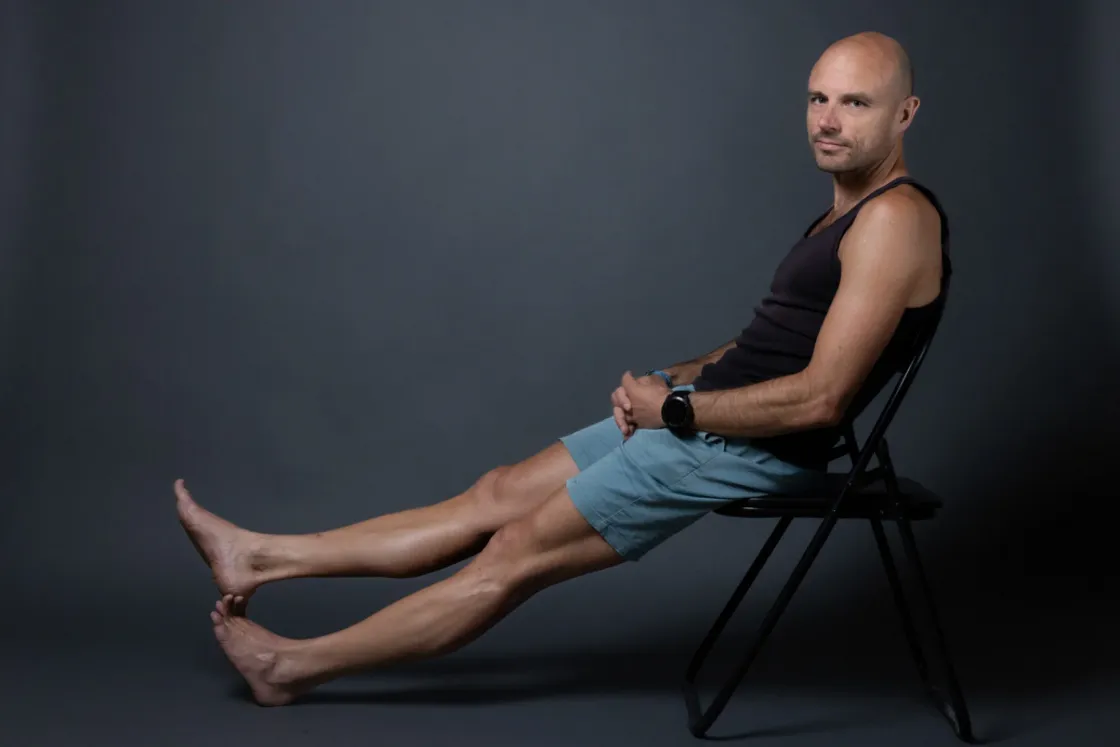
- The last time Balázs Simonyi set a Hungarian record was on the National Blue Trail, when he covered the distance of 1172.5 kilometres in 15 days, 6 hours and 50 minutes. He has completed a distance of over 200 kilometres about 25 times, and has finished the 246-kilometre Spartathlon, one of the main events of ultra running, nine times in a row, finishing 5th in 2019.
- In spite of this, he's more and more reluctant to be asked only about running, which is understandable given his unusually varied career.
- He's been a voice-over artist since the age of five, he was the Hungarian voice of Bart Simpson and The Lion King's young Simba, and has appeared in thousands of films and commercials over the course of thirty-eight years.
- He is also one of the founders of the improvisation ensemble Momentán and has had several bands. He is a multiple Press Photography Award winner, and his photos have appeared in numerous newspapers, from Magyar Narancs to the former Index. He is the host of several podcasts.
- He started making films in the early 2000s and has since directed a few dozen documentaries and short feature films. His best-known documentary, ULTRA, is currently streaming on HBO Max. He was also filming during the two weeks he spent completing The National Blue Trail. The ten-part series he made there is set to premiere in the winter of 2024.
- In spite of all this, we mostly talked to him about running: we asked him if there was anything heroic about running hundreds of kilometres; what he calls the culture of whining; how his grandmother is involved in long-distance running; and why the prime minister would be forced to confront himself if he started jogging tomorrow.
The world of runners is the perfect opposite of a Central and Eastern European country, because running is objective, democratic and fair, you said in a lecture a few years ago. Does it also follow that if enough people run, this ethos will have an impact on the way society functions?
For a long time I believed that running makes you a better person. But this isn’t true: it does transform you physically, it fine-tunes your mental abilities, but you are still the same person you were born as. It doesn't work like the Iron Bulldog in Cat City, where the bad cats went in and then came out on the slide as better cats. But running, or should we say grassroots sport, can play a very important role in a nation's economy. Because the healthier people are, the more they can relieve their stress through exercise, the better it is for the state and the society, because the more energetic people are, the less frequently they’ll be sick, there will be less pressure on hospitals, and less money will have to be paid out in sick pay, life expectancy will be longer and perhaps there will be less abuse within families.
Promoting prestige sport is about appearances, about armchair fun. Getting away with things, being a spectator, and comfort are the biggest drugs of our time. Politicians aren't setting a good example either. Although I did bump into Gergely Gulyás (Minister at the Prime Minister's Office) again on Sunday while I was out running, he usually jogs around my neighbourhood. I almost stopped him, but I also hate it when people talk to me while I'm running, so I didn’t.
What would you have said to him?
That I really appreciate that he’s running. He comes out and does it regularly in a cotton shirt, nothing fancy. He was obviously sweating and struggling quite a bit, but he still kept running smoothly down the street, exposing himself to civilians. That's unusual.
There is another minister from the government who runs, but he takes it seriously and makes sure to be seen.
He gets out there though! But that's still only two of them. And I hear Péter Szijjártó runs with a bodyguard.
But he ran the half marathon without bodyguards...
He usually does it in around 1:30, I know.
What does 1:30 count as for 21 kilometers?
It would be embarrassing for Kipchoge, but it's a decent time for an amateur. Although I recently ran it in 1:30 with a double jogging stroller with two little ones in it. Oops, that's the athlete in me talking, who’s eternally measuring and comparing. It's not the finish time that counts though, but the activity itself. I’ve been last at UltraBalaton and 5th at Spartathlon. So it would be important for the state to invest in mass sport, to reward effort with some kind of reimbursement, discounts, prioritization. But it would be abused for sure.
So it wouldn't get us far if Viktor Orbán were to start jogging tomorrow and if he called on everyone to follow his example?
Wasn't he the one who said, "Don't listen to what I'm saying, watch what I'm doing"? Yes, of course, that would make a difference, and it would also have an impact on Viktor Orbán. Gergely Gulyás sees him more often, I hope he’ll recommend running to him.
Only, in running there is no ball and no fighting involved. At most, you're fighting yourself, and the time, the distance. Because even though the Iron Bulldog that makes you better doesn't exist, it's certain that when you run, you come face to face with a bunch of things: your awareness of your own body, your management capabilities, whether it be a metabolic or a mental crisis, and the fact that you don't deserve things, but have to work for them bit by bit, because there are no privileges, there’s no instant success. There is full equality in running, everyone is taking steps to get from A to B. Of course, you can fall over to the other extreme and become addicted to running.
Are you addicted?
No. I’m loyal to running, but I have plenty of other things to do. I didn't really run much even when I was training for something, and for a while now I've been doing it more for my well-being. Races don't get me so excited anymore.
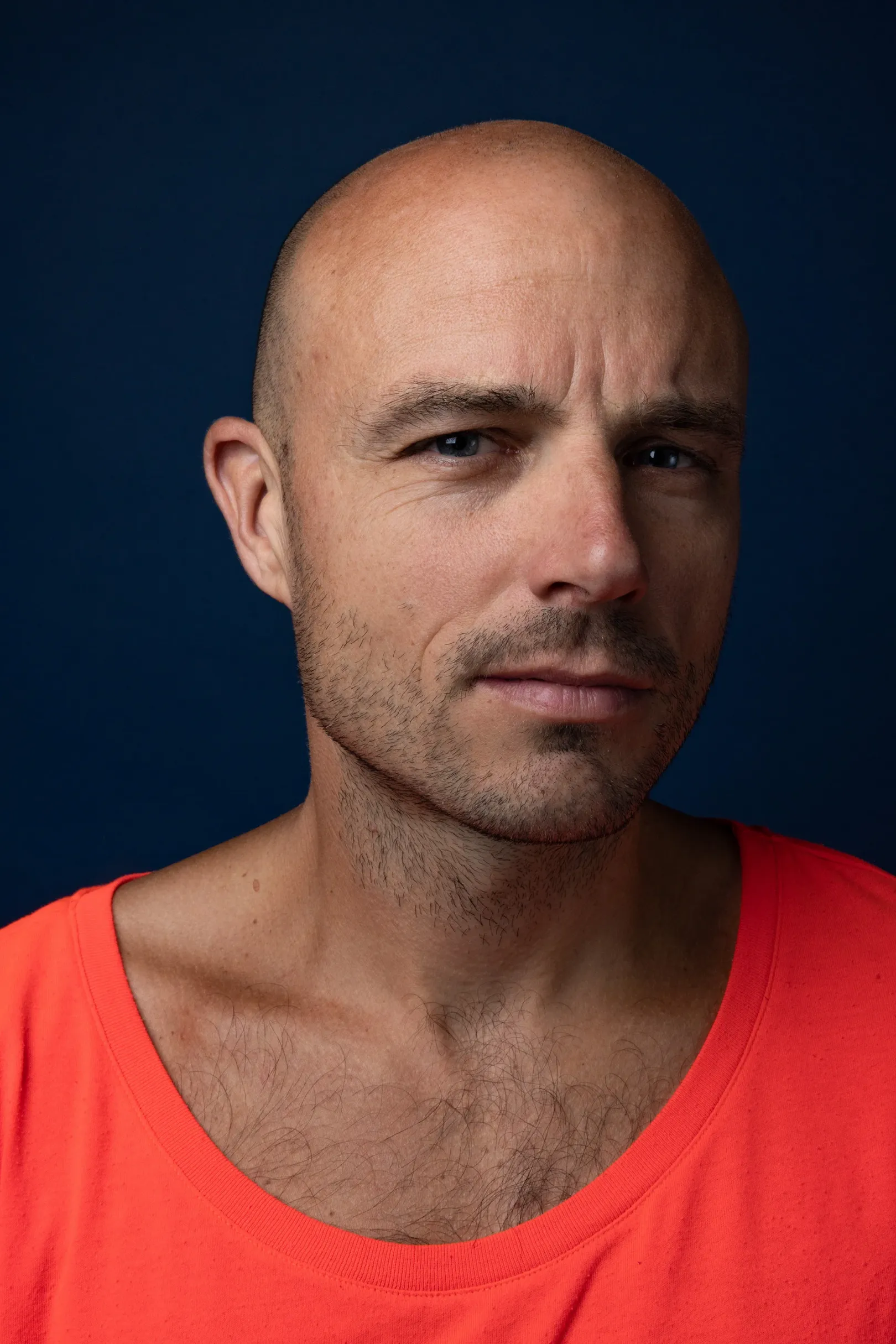
In spite of this, you are planning to run Spartathlon's 246 kilometres for the tenth time in September.
Because it's one of the celebrations of my hobby. I have a lot of friends there, I speak some Greek, I enjoy the scenery, the culture. You can train like crazy and still be out of the race. Even now I don't train more than an hour a day. It's mostly all from memory, as I've run numerous ultras, I've covered distances of over 200 kilometres or races of over 24 hours dozens of times. The body doesn't forget: after a few hours it will understand that we're doing this thing again.
Does this mean that for you, training is more about having the right mindset?
Yes, but it would be a frivolous exercise if I wasn't physically ready. I'm pretty sure that ninety-nine per cent of the time people give up, it's because of the wrong mindset. I've never given up a race before, because the reason why I went there in the first place was to get through it. Most people quit because they are tired or can't stand the pouring rain or the stinging blisters. But it rains on everyone and everyone is tired. We have a strong culture of whining. To give up is to magnify the difficulties, to self-manipulate.
Self-esteem may waver and may get low during the activity itself, but the success at the end gives it a boost. If one thinks about the fact that they've been running for two hours and have only covered twenty kilometres, but still have two hundred and thirty to go, they're likely to crack.
But everything comes to an end at some point, both the distance and the pain – I can't think of a better way to comfort myself.
There’s nothing more I need for this, and if I need to keep forcing myself to do it, then I’m doing it wrong. I'm the kind of person who needs motivation to go to a housing meeting or fill out an elaborately worded tax form. I really don't know of any other activity that allows you to be alone with yourself for such a long time and to such an extent: it opens up an intense communication between the two sides of your brain, it strips away the poses, the mannerisms, the arrogance.
"By the end of this thing, I'm either going to hate this fucking filming or this fucking running, or both" – your documentary about Spartathlon entitled ULTRA, begins with this sentence, followed by a lot of swearing. Does swearing help you cope?
In the early years, long distance races affected me very badly. I was arrogant and grumped a lot. Then, probably at the '14 Spartathlon, when I was at the 198th kilometer and I was very broken and have really had it, I stopped and cursed uncontrollably. Then a jovial Brazilian gentleman sauntered up to me and asked, "Why are you ruining your beautiful run?" and then he glided off. But really, why? This was my choice. In time, I also realized that all this pathetic self-pity and complaining about pain was ridiculous. One looks for meaning in all suffering, and when they find it, they even want to ascribe value to it to reverse-explain their own intentions.
Suffering is not a virtue, but a circumstance.
It's not the physical pain that bothers me, it's the sleepiness mostly, and I admit that I often get bored of certain parts of the races, and those are the parts I curse about nowadays. Although in a book called "Világló részletek" (Illuminated details) a clever man (Hungarian writer Péter Nádas) once wrote that boredom is how stupid people entertain themselves, and that your own stupidity is your own private affair. Another clever man once suggested that in case of boredom, one should buy a raccoon.
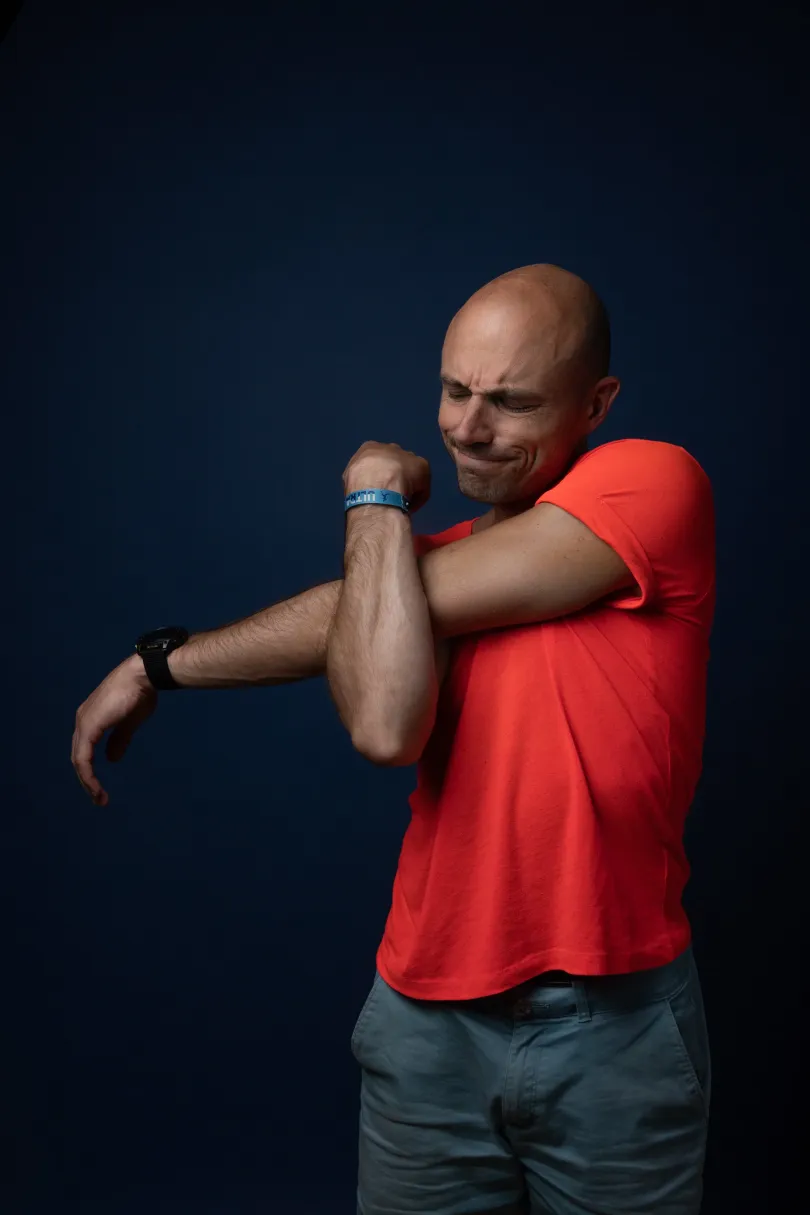
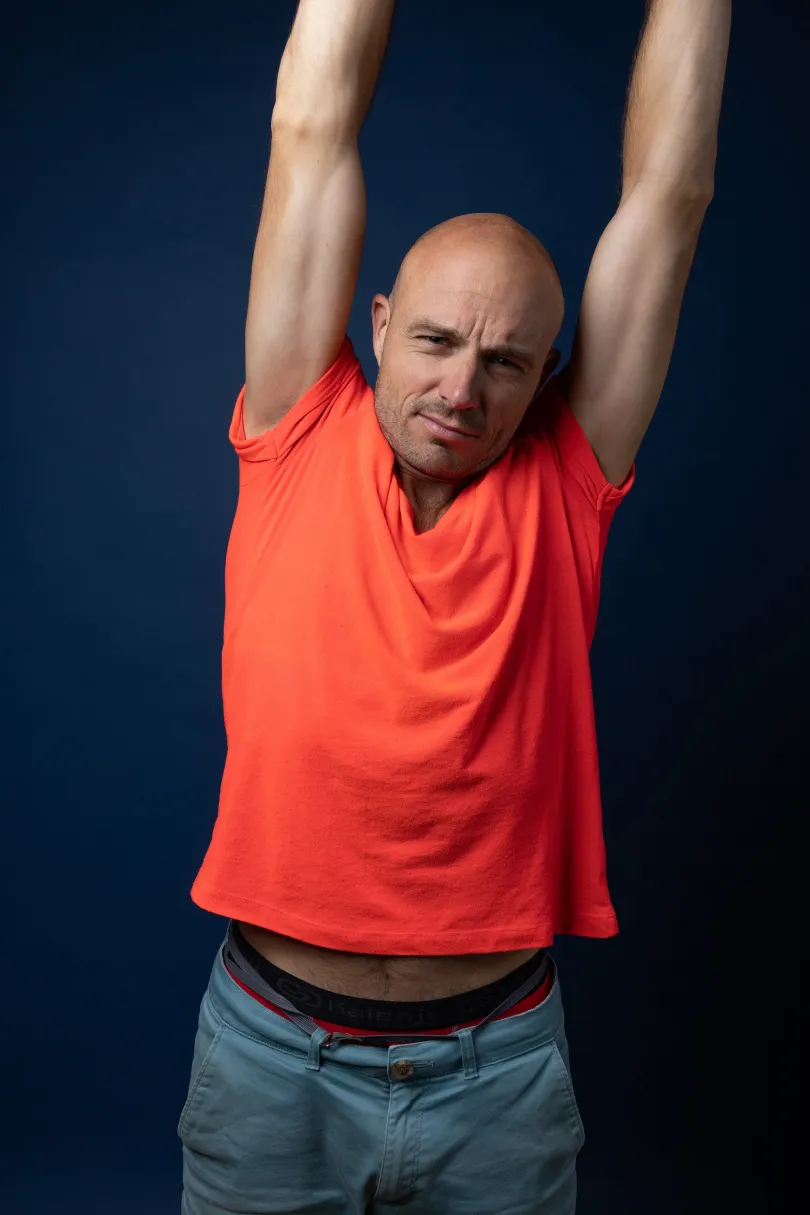
Boredom is not really an issue with you, you have an incredible amount of things going on. Is it a constant FOMO that's causing this restlessness?
I have always consciously strived to do what I love, what inspires me. A lot of people specialize in one thing and try to get better at it; I'm interested in more than one thing. But this isn’t advantageous in Hungary. If you're doing a lot of things at once, even if you do them well, many think you're clowning around, and they won't take you seriously enough. The photographer who also plays music is suspicious, the filmmaker who takes to the stage is a clown. There was a time when I had three different resumes so that they wouldn't see my other activities. But the world is now very much going in the direction of having several feet to stand on, one thing you do actively, while the others emerge as hidden streams when you need them.
I value work, but instead of being a workaholic, I enjoy trying things. I've been a bike courier several times, worked as a night snow plowman, guarded an ice cream counter at the Castle, and have also run a pop-up restaurant. I've never had a boss or worked an 8-4 job, I'm not a good subordinate.
Bart Simpson, the little boy in Kramer v. Kramer, The Lion King's Simba, Macaulay Culkin, Elijah Wood, Edward Norton's films – these are your most famous voice roles. What was the very first one?
A Soviet film called Grandma. At the age of five. It all started when I learned the lyrics from the tape of "Lúdas Matyi" (a Hungarian epic poem based on a folk tale, written by Mihály Fazekas – TN) and performed it on Vitray's 1985 X-Factor-type show, where a random jury of people from cultural centres across the country voted on the performers: the longer you were liked, the bigger your prize. I was well liked, Vitray had a hard time getting me off the stage, and I ended up with 4800 forints, which our family used to buy a washing machine in Vienna. It was after this that the voice-over industry discovered me, even though I could only read capital letters.
Did being a child actor also have some more harmful consequences later in life?
Even though I worked a lot and sometimes appeared in the TV Guide, I had a decent childhood, if that's what you mean. I went to elementary school, high school, played football with the kids in the neighbourhood. Margit Földessy's drama studio provided me with great creative impulses. I hung out at the library instead of going to solfege lessons, then I graduated with the best grades, and during high school I successfully passed the intermediate language exam in Latin and English.
The studios of the public TV and Pannónia provided a contrast, demanding concentration and a sense of responsibility: I had to rise to the task when I worked alongside Klári Tolnay or Imre Sinkovits (both legendary Hungarian actors – TN) My work was appreciated and it paid well, I could buy a Lutra album with my own earnings. It's a pity that it took a while before we realized that as much as dubbing is comfortable for the audience, it’s also destructive: it grossly interferes with the original work of the artists and alters people's style of speaking, as they adopt the affectations and the cartoonish speech of the voice actors. Just listen to a dubbed film without the images: it's really unsettling. So I compromised, but it allowed me the freedom to express myself in other ways.
But this wasn't the reason why you started running in 2007. As you've said it several times, you got into it because you were burnt out. Burnt out from what?
Because everything was going well and I felt that this success was not sustainable, I was satiated. Around 2005-2007, I had several films screened at major festivals, Barnabas Tóth and I hosted a weekly show about films called Moziverzum on TV2, and if I went home from a theatre performance on a Wednesday night, the next morning I was likely to find a newspaper in the mailbox that I had photographed or written for, or that had written about me. Then I'd take my kid to daycare, record the sound for a TV or radio ad, go to rehearsals, do a shoot. My life was so condensed that I was no longer happy. I could have snorted drugs, I could have started drinking, (there were examples of this in the family) but I went for a jog instead. And now we're at the point where I'm being categorized as a runner, which is an overstatement. I'm just a hobbyist.
I don't know what I’d do if I were to burn out again.
Did you have to tune down your ego as well?
I always had a healthy dose of self-confidence. And I also have a selfish side, a strong drive, without which you can't do anything. Running also transforms the ego: it shows you how far you can go, but it's also a constant reminder of how tiny you are. It shows you what you are capable of in the clearest and most objective way. This is unlike the art scene, where you depend on factors that are hard to control, such as other people's taste, luck, connections, while how you perform is secondary.
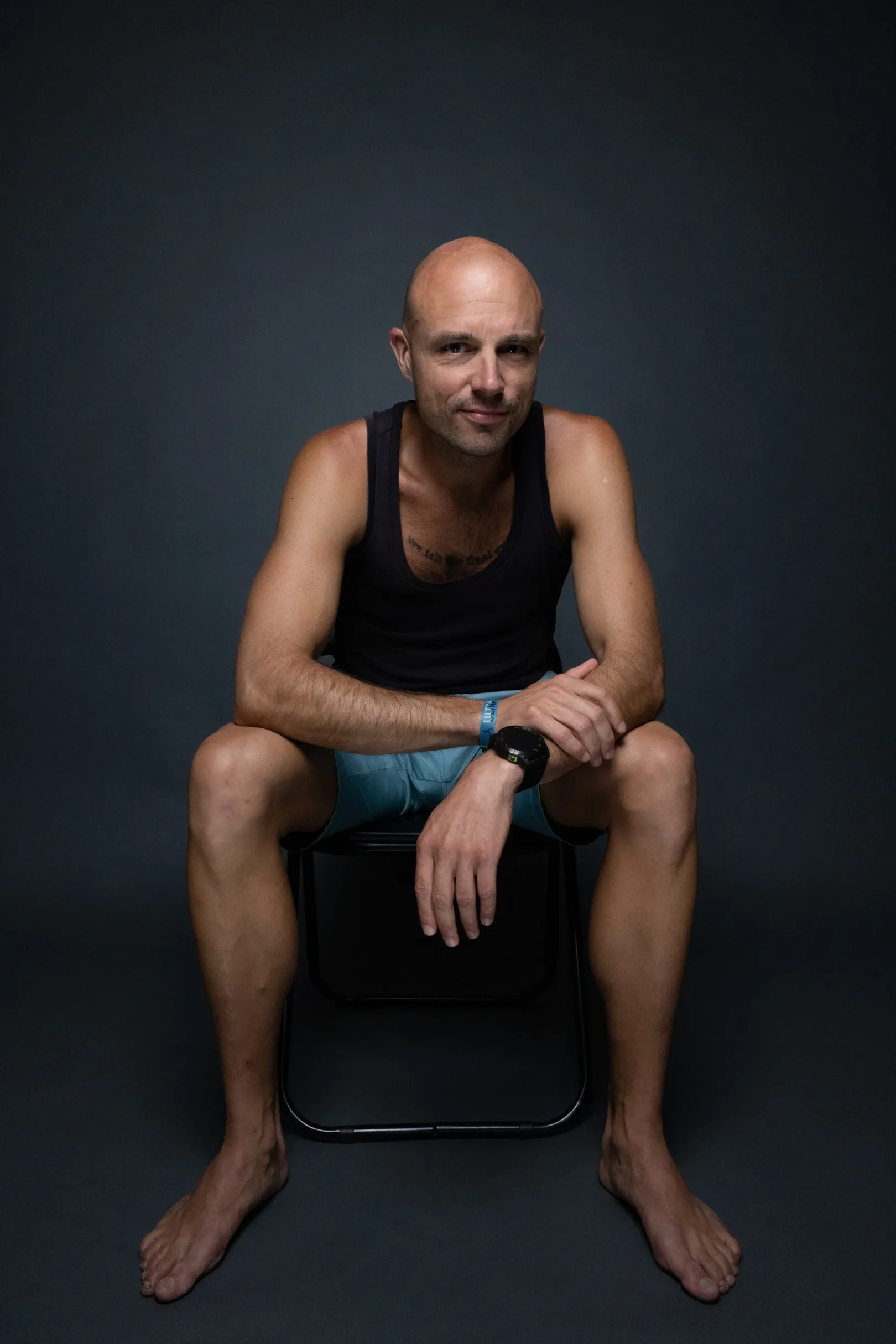
What's your opinion on the discourse surrounding the death of Szilárd Suhajda, (Hungarian climber who died while attempting to climb Mount Everest in May this year – TN) what do you have to say about it?
I think I know why you’re bringing this up, but I don't think there’s a parallel between ultra running and mountaineering. First of all, because, unlike extreme sports, ultra running is completely safe. Sometimes a jogger gets attacked by a bear or someone gets hit by a car, but that can happen to anyone, I have had shepherd dogs chase me in the Peloponnese too. Sudden cardiac arrest doesn't happen on ultras either, it happens during urban marathons.
Getting back to Suhajda, I don't know who to feel sorry for and what my pity is worth to anyone. In this case, a life was lost for the sake of seizing the moment, and at least one more was put on a different track. I was shocked by the whole thing, and I was not only sympathetic but also angry, being the father of four children.
I draw a very simple line on this issue: are you single? If so, then go ahead and provoke death, go cave diving or wingsuit flying.
I wrote about climbers for Magyar Narancs ten years ago and didn't meet many family men among them. I recently spoke with László Mécs, a mountaineer, who said he was anxious to climb, but he has a young child and would think about it twice.
Gábor Rakonczay (Hungarian extreme athlete – TN) told me that the reason why he goes on expeditions is because he wants his daughter to be proud of him when she grows up. Or there's Dávid Klein (Hungarian climber) who many smile about, because he’s failed to reach a summit so many times,, but doesn't that mean he always made the right decision? Szilard Suhajda was not irresponsible, but responsible, because only by making a whole series of responsible decisions can one become a mountaineer. However, although responsible, he was cynical, at least as a father. It’s also a bit odd to see his wife giving a motivational lecture after all this.
And isn't it cynicism to see exceptional human achievement as unheroic?
There is nothing heroic about it. It’s a misunderstanding of proportion and role. A hero is someone who goes in to a place others are coming out of. A hero doesn’t destroy things, it’s the person who says take me and not him. Gilda in Rigoletto is a hero, she dies instead of the idle prince. The local fireman does more for the glory of Hungary than a climber or an athlete. In some cases, of course, a cave diver can be a hero, like my fellow Spartathlon runner John Volanthen from England, who rescued a children's football team trapped in a cave in Thailand. In sport, too, it’s blatantly absurd to talk of 'heroic deeds' and 'self-sacrificing tackling'.
So what is Spartathlon for? Because then there is nothing heroic about running 200-300 kilometres either.
Nothing. The runners’ nationalities shouldn’t even be there next to their name. I've never crossed the finish line with a flag. I do it for myself, for fun. I measure where I am within a pack. But I don't even need that. When I was 40, I ran up to all the major Greek peaks in a week, and when I was 42, I ran 420 kilometres in five days from Thermopylae to Sparta, over hills and through valleys, with a small backpack. Just because.
The mountaineering parallel came to me because of the role of relatives. In ULTRA, we see two different attitudes: the mother of the French athlete in the race continues to push her child even when he’s in great pain, and the wife of the Hungarian Béla Szabó is so afraid for her husband that she begs him to stop. Even if ultra running is a relatively risk-free sport, do your family members worry about you?
My mom died in a car accident when I was eleven, but if she had lived, she would have been interested in me running, because she encouraged me in everything I did. In the beginning, my parents always bowed to my independence and stubbornness, they didn't stop me. My father didn't care about my running, but if he did, he took it to his grave. Both he and my grandmother died during Covid. My grandmother couldn't understand what all this running stuff was for, it bounced off her after the hard life she had lived. She survived the German and the Soviet occupation in their house, was deported, had her kidney removed, and survived breast cancer. During the Second World War, as a little girl, she used to take their produce from Csobánka to the market hall in Pest every day, which was 22 kilometres to the market and 22 kilometres back. And that's the baggage my partners got me with.
I'd be flattered if anyone was worried, but it's more like popping down to the grocery store.
Could mid-life crisis be the reason why long distance running is mainly a hobby for the over-40s?
To use a tennis analogy, it's the classic forty-love scenario. It could be burnout, it could be trauma, it could be escape, it could be a psychological deficit, it could be a need for change. But there's also a practical reason for this, as this is when people reach a stage in their lives when they have more time for long training sessions, because their children are older and they are mentally more put together and can handle monotony better. Although more and more young people are starting to do long distances, the Ironman is not the thing any more, the ultra is the new marathon: fashion, bucket lists, peer pressure.
Running is a remedy or a cover-up for real problems, but it creates luxury problems: which race should I enter, what should I wear, what refreshments should I use? Or there's the Lithuanian ultra-running phenom Sorokin, who used to row but wasn't good enough to make it to the Olympics, so he started drinking and smoking, but then around 40 said that was unsustainable and figured out how to satisfy his former ambition. Since then, he has pretty much broken every record in ultra running.
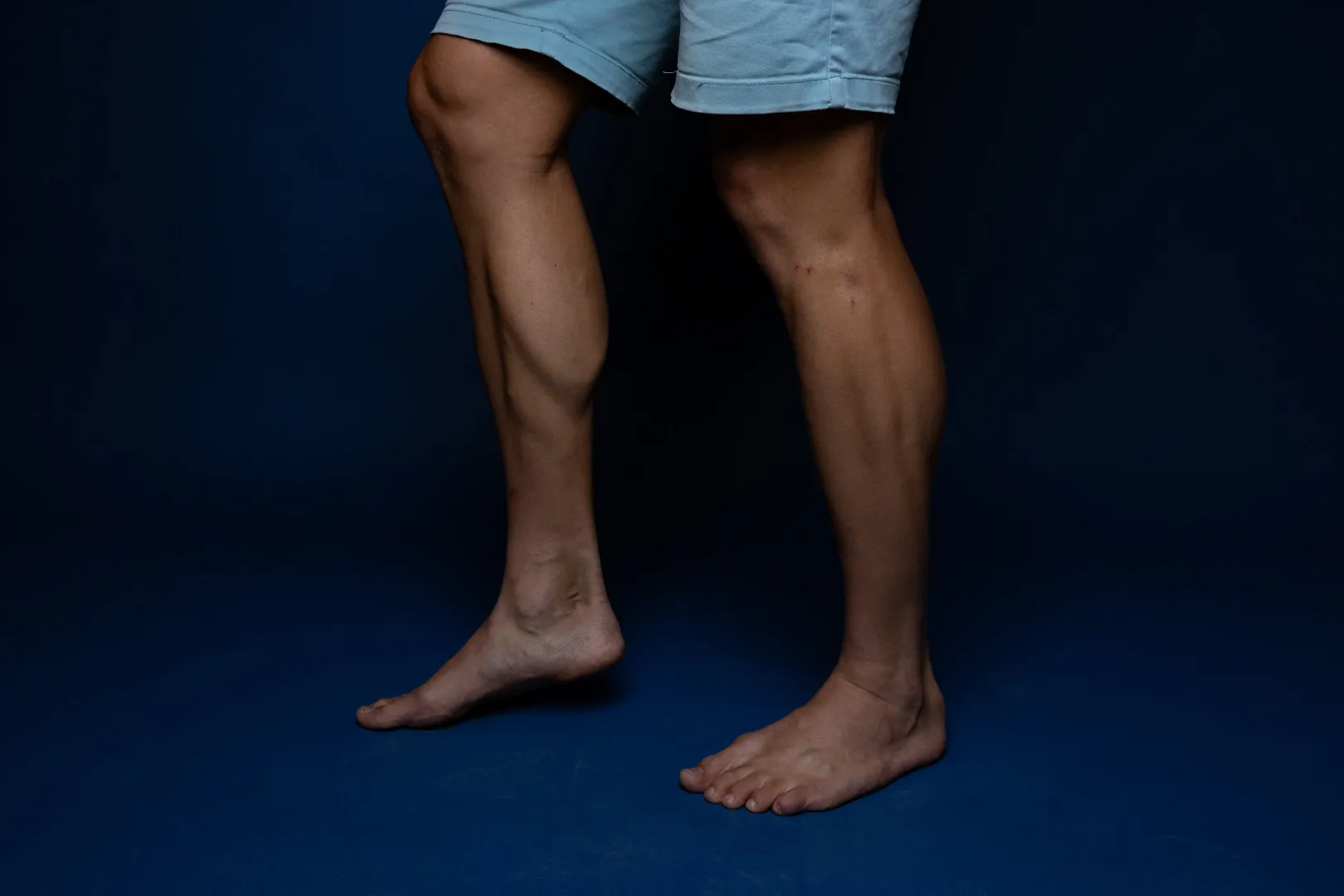
You set a national record by completing the Blue Trail in roughly 15 and a half days. In just over two weeks, you were able to gain an essential natural and sociological insight into the Hungarian countryside on the Írott-Kő-Hollóháza corridor. What were your primary impressions?
Blue wells, Kádár cubes, abandoned railway stations – these are the things that come to mind at first. My sociological observations are rather amateurish, although Greece, where I spend a lot of time, can be a good reference. Whatever village you go to there, you're sure to find a pastry shop or bakery with great stuff and good coffee. There will also be a taverna with fresh, warm food of reliable quality. And you'll also find the heart of the village, where community life takes place.
In contrast, the Hungarian countryside sports a national tobacconist's with limited opening hours, where you can buy stimulants and addictive things. There’s a tiny grocery store usually called Andi’s, Nelli’s, or Zoli’s offering basic groceries, all marked up. In Jósvafő, a kilo of tomatoes was 3,000 forints, a bread roll 120. You won't find a restaurant or a café open on a weekday across eight or ten villages.
The region of Cserehát is like a vacuum, you hardly see a single person on the street, whereas it's an incredibly beautiful area, full of beautiful but dilapidated houses. I think there is great potential in Cserehát, and I wouldn't be surprised if it became the next Káli Basin.
We used the Alrite speech-to-text application as part of a paid collaboration for this interview.